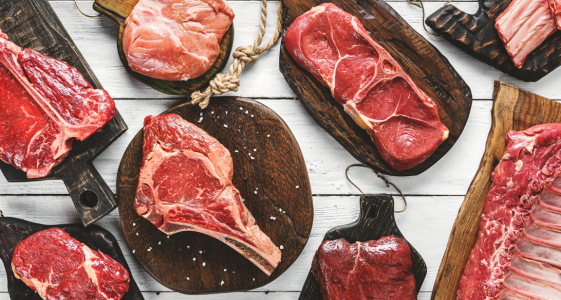Protect Your Dinner Table: How a Harsh Winter Could Force You to Settle for Lower Quality Meats
By
Gian T
- Replies 9
As the winter chill thaws and we welcome the warmer breezes of spring, Australians are bracing for an unexpected impact on their dinner tables. A particularly dry and cold winter has left its mark on the agricultural sector, with farmers across one state sounding the alarm on the potential for lower-quality meat cuts to hit the market. This could mean that the succulent steaks and premium cuts we're accustomed to could become a rarer sight in our local supermarkets.
The root of the issue lies in the challenging weather conditions that have stunted crop growth, a vital source of feed for livestock. With pastures not providing enough sustenance, farmers have had to resort to feeding their animals hay and straw, which, while necessary, doesn't yield the same quality of meat as a diet rich in natural grasses and grains.
The National Farmers Federation President, David Jochinke, has highlighted the dire situation, noting that the scarcity and increased cost of feed are pushing farmers to make tough decisions. Some are considering selling their sheep and cattle before they've reached optimal production levels, which inevitably leads to a surge in lower quality cuts in the market. This means that while we might see an increase in the availability of trims and lower grade cuts, the big, juicy steaks we love could become less common.
The financial strain on farmers is palpable, with the cost of barley and hay skyrocketing. Jochinke himself has witnessed the price of barley jump from $229 per tonne in March to a staggering $340 per tonne by August. Hay has followed suit, climbing from $220 to $300 per tonne in just half a year. These price hikes are not just numbers on a page; they represent a significant burden on the agricultural community, which is already grappling with the unpredictability of Mother Nature.
While Victoria and South Australia have been grappling with the cold, other parts of Australia have experienced record-breaking warm temperatures during the winter months. This contrast in weather patterns across the continent further complicates the agricultural landscape. Professor Guy Roth from the University of Sydney Northern Agriculture and Plant Breeding Institute warns that even a slight increase in average temperatures can affect crop yields, potentially leading to a 5% loss with just a one-degree rise.
However, it's not all doom and gloom. Some regions, like Northern NSW, are enjoying a bountiful season thanks to ample rainfall, with wheat crops expected to yield significantly more than average. This serves as a reminder of the vastness and diversity of Australia's agricultural conditions, where one farmer's struggle is another's boon.
The agricultural sector is a complex and delicate ecosystem, often described as a balancing act by those who work within it. As consumers, we have the power to support our farmers by choosing Australian-grown produce whenever possible. By doing so, we not only ensure the sustainability of our local farming communities but also maintain the high standards of food we've come to expect.
So, as we navigate the aisles of our local supermarkets, let's make a conscious effort to seek out Australian labels. It's a small gesture that can have a profound impact on the livelihoods of our farmers and the quality of the food on our tables. Remember, when we buy Australian, we're not just filling our plates; we're investing in our nation's agricultural future and helping to keep the industry resilient against the whims of the weather.
 Members, we'd love to hear from you. Have you noticed changes in the meat quality available at your local stores? How important is it for you to buy Australian-grown produce? Share your thoughts and experiences in the comments below, and let's continue to support our farmers through thick and thin.
Members, we'd love to hear from you. Have you noticed changes in the meat quality available at your local stores? How important is it for you to buy Australian-grown produce? Share your thoughts and experiences in the comments below, and let's continue to support our farmers through thick and thin.
The root of the issue lies in the challenging weather conditions that have stunted crop growth, a vital source of feed for livestock. With pastures not providing enough sustenance, farmers have had to resort to feeding their animals hay and straw, which, while necessary, doesn't yield the same quality of meat as a diet rich in natural grasses and grains.
The National Farmers Federation President, David Jochinke, has highlighted the dire situation, noting that the scarcity and increased cost of feed are pushing farmers to make tough decisions. Some are considering selling their sheep and cattle before they've reached optimal production levels, which inevitably leads to a surge in lower quality cuts in the market. This means that while we might see an increase in the availability of trims and lower grade cuts, the big, juicy steaks we love could become less common.
The financial strain on farmers is palpable, with the cost of barley and hay skyrocketing. Jochinke himself has witnessed the price of barley jump from $229 per tonne in March to a staggering $340 per tonne by August. Hay has followed suit, climbing from $220 to $300 per tonne in just half a year. These price hikes are not just numbers on a page; they represent a significant burden on the agricultural community, which is already grappling with the unpredictability of Mother Nature.
While Victoria and South Australia have been grappling with the cold, other parts of Australia have experienced record-breaking warm temperatures during the winter months. This contrast in weather patterns across the continent further complicates the agricultural landscape. Professor Guy Roth from the University of Sydney Northern Agriculture and Plant Breeding Institute warns that even a slight increase in average temperatures can affect crop yields, potentially leading to a 5% loss with just a one-degree rise.
However, it's not all doom and gloom. Some regions, like Northern NSW, are enjoying a bountiful season thanks to ample rainfall, with wheat crops expected to yield significantly more than average. This serves as a reminder of the vastness and diversity of Australia's agricultural conditions, where one farmer's struggle is another's boon.
The agricultural sector is a complex and delicate ecosystem, often described as a balancing act by those who work within it. As consumers, we have the power to support our farmers by choosing Australian-grown produce whenever possible. By doing so, we not only ensure the sustainability of our local farming communities but also maintain the high standards of food we've come to expect.
So, as we navigate the aisles of our local supermarkets, let's make a conscious effort to seek out Australian labels. It's a small gesture that can have a profound impact on the livelihoods of our farmers and the quality of the food on our tables. Remember, when we buy Australian, we're not just filling our plates; we're investing in our nation's agricultural future and helping to keep the industry resilient against the whims of the weather.
Key Takeaways
- Australian farmers warn that lower-quality meat cuts could be on the rise due to a dry, cold winter impacting crop and pasture growth.
- Livestock are being fed hay and straw as a result of poor conditions, which could mean an increase in lower-quality cuts of meat on supermarket shelves.
- National Farmers Federation President David Jochinke suggests consumers may see more premium cuts domestically but also an increase in lower-quality trims and cuts.
- Support from consumers buying Australian produce can greatly help farmers who are dealing with the effects of unpredictable weather and feed cost increases.








